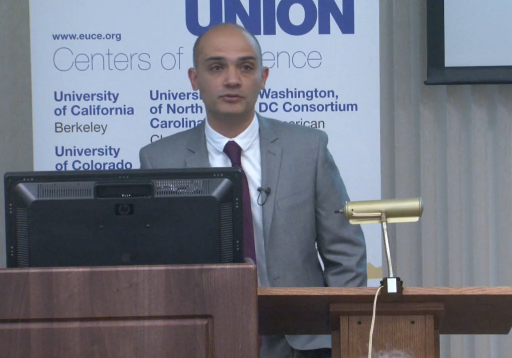 As part of the Visiting Scholars Lecture Series, Christos Kourtelis gave a lecture entitled "The
As part of the Visiting Scholars Lecture Series, Christos Kourtelis gave a lecture entitled "The
Integration of the Arab Mediterranean Countries into the EU Market: The European Neighbourhood Policy as a Three-Level Game" on May 2, 2014. Dr. Kourtelis is currently a teaching fellow in European and International Studies at King's College London.
From Dr. Kourtelis' abstract:
The EU response after the Arab Spring was to announce a new and more ambitious European Neighbourhood Policy (ENP) with the aim to make the ENP more objective and effective. The new ENP is based three axles; Money, Market access and Mobility. The few papers that have been produced so far question the effectiveness of the 3Ms, but more specific accounts of the revised policies are still lacking. The aim of this paper is to fill this gap in the existing debate by analyzing the implementation of the Tunisian and Egyptian ENP Action Plans (before and after the Arab Spring). More specifically, this paper uses Putnam’s two-level game analysis in order to measure the impact of the ENP reforms in the agricultural and industrial sector of these countries. The main point here is to evaluate the ENP changes by understanding the role of the social forces and their interaction with statesmen, to realize the win-sets in both regions and to see the interest groups that benefit and lose from the new policies. Particular attention will be given to the contribution of the ENP to the development of a dual agricultural market in these countries and to the effects of standardization for the North African businesses. The paper explains the commercial and political gains for the participants and argues that the ideas of policy makers have not changed substantially after the Arab Spring. Under these conditions, the chances for the ENP to become a successful foreign policy strategy are slim.A video of the lecture is available to view in the EUC's Video Library or below:





0 comments:
Post a Comment